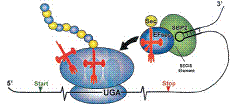Biochemistry, Department of

Vadim Gladyshev Publications
Document Type
Article
Date of this Version
February 2004
Abstract
Selenium is essential in mammalian embryonic development. However, in adults, selenoprotein levels in several organs including liver can be substantially reduced by selenium deficiency without any apparent change in phenotype. To address the role of selenoproteins in liver function, mice homozygous for a floxed allele encoding the selenocysteine (Sec) tRNA [Ser]Sec gene were crossed with transgenic mice carrying the Cre recombinase under the control of the albumin promoter that expresses the recombinase specifically in liver. Recombination was nearly complete in mice 3 weeks of age, whereas liver selenoprotein synthesis was virtually absent, which correlated with the loss of Sec tRNA [Ser]Sec and activities of major selenoproteins. Total liver selenium was dramatically decreased, whereas levels of low molecular weight selenocompounds were little affected. Plasma selenoprotein P levels were reduced by about 75%, suggesting that selenoprotein P is primarily exported from the liver. Glutathione S-transferase levels were elevated in the selenoprotein-deficient liver, suggesting a compensatory activation of this detoxification program. Mice appeared normal until about 24 h before death. Most animals died between 1 and 3 months of age. Death appeared to be due to severe hepatocellular degeneration and necrosis with concomitant necrosis of peritoneal and retroperitoneal fat. These studies revealed an essential role of selenoproteins in liver function.


Comments
Published in THE JOURNAL OF BIOLOGICAL CHEMISTRY, Vol. 279, No. 9, Issue of February 27, pp. 8011–8017, 2004.